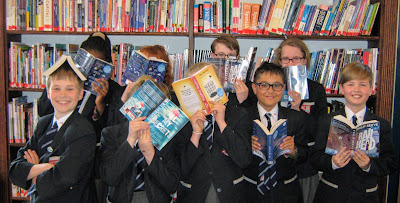If you have an interesting or unusual word that you want to share with everyone, please ask for an entry form in either of the Libraries. The competition is available to enter in both the Discovery and War Memorial Libraries. All Word of the Week winners receive a pen of their choice!
Discovery Library
Haphazard
Adjective: not organised or planned; slapdash.
chosen by Christopher (8MP)
Enrapture
Verb: To fill with intense delight.
chosen by Kursat (7BT)
Kerfuffle
Noun: A commotion or fuss.
chosen by Rebecca (8WN)
Excruciating
Adjective: Very intense [pain]; very embarrassing, awkward or tedious.
chosen by Megan (8FH)
Elucidate
Noun: To explain or clarify
chosen by Roseanna (8MP)
Vivid
Noun: (of colour) intensely deep and bright, like a rainbow: powerful feelings or strong clear memories in the mind.
Protestation
Noun: A strong declaration in response to doubt or accusation.
chosen by Ben (8SH)
Obstreperous
Verb: Noisy and difficult to control (making things difficult just for the sake of it). The slang version of this word is stroppy.
chosen by Charles (7AH)
Zionism
Noun: A movement for the development and protection of a Jewish nation in what is now Israel.
chosen by Melanie (8FH)
Vertigo
Noun: A sensation of dizziness felt because ones balance is disturbed.
chosen by Kursat (7BT)
Tangible
Adjective: Something that can be touched or felt.
chosen by Oscar (7WL)
Nirvana
Noun: In Buddhism and Hinduism, the highest state of knowledge and understanding achieved by mediation.
chosen by Tom (7CT)
Picturesque
Adjective: Visually pleasing or quaint, as if resembling a picture.
chosen by Isabelle (8CS)
Abrasion
Noun: The process of scraping or wearing something away. In Geography, rough seas fling pebbles against the rocks, these pebbles act like sandpaper.
chosen by Valon (9BL)
Preposterous
Adjective: Laughable, an idea that is obviously not realistic.
chosen by Rosanna (8MP)
Zodiac
Noun: In Astrology, a circular or elliptical diagram representing figures associated with constellations; an area of the sky through which the sun, moon and most of the planets appear to move, divided into twelve astrological signs each named for a constellation of stars.
chosen by Ali (7NE)
Stoic
Noun: A person who does whatever is thrown at them without showing their feelings or complaining.
chosen by Rosanna (8MP)
Hermaphrodite
Adjective: In Biology, an organism, such as an earth worm or flowering plant, that has both male and female reproductive organs.
chosen by Suwarnan (8BA)
Lugubrious
Adjective: Laughable, an idea that is obviously not realistic.
chosen by Rosanna (8MP)
War Memorial Library
Tangential
Adjective: Of superficial relevance only; digressive
chosen by India Lindsay (13CP)
Conformity
Noun: Changing behaviour and/or beliefs in order to fit in with a group of people.
chosen by Harry (12CC)
Brachycephalic
Noun: Means short headed. In dogs, it applies to breeds with a short snout or a broad short skull e.g. pugs.
chosen by Eloise (12HW)
Obnoxious
Noun: Extremely unpleasant.
chosen by Jordan (10 HY)
Melliflous
Adjective: Pleasant sounding and musical to hear.
chosen by Mahira (13CP)
Odious
Adjective: Extremely unpleasant, repulsive.
chosen by Geoffrey (10SY)
Aperçu
Noun: A comment or brief reference, which makes an illuminating or entertaining point.
chosen by Ms Roberts (Librarian)
Acrimonious
Adjective: Full of bitterness
chosen by James (12SS)
Exacerbate
Verb: To make a situation or problem worse.
chosen by Comert(10RE)
Psychocentric
Adjective: A psychological term for a person who prefers the familiar and is not open to new experiences. Psychocentric travellers are said to prefer trips close to home and to seek familiar environments.
chosen by Christopher (13WB)
Usurp
Adjective: To take (a position of power/importance) illegally or by force.
chosen by Frankie (13ME)
Toponymy
Noun: The study of place-names of a region or language.
chosen by Mr Nazer (Science)
Monotropy
Noun: In Psychology, the concept that infants have an innate and inborn capacity to attach primarily to a single caregiver or attachment figure.
chosen by Eloise (12 HW)
Orthogonal
Adjective: Of or involving right angles; at right angles. In statistics, it refers to the independence of variates.
chosen by Frankie (13ME)
Factionalism
Adjective: Fragmentation of the political system into separate groups, who then compete for patronage.
chosen by Mr Mills (History)
Bildungsroman
Noun: A novel based upon the moral and psychological development of the main character from youth to adulthood; a coming-of-age- novel.
chosen by Mrs Nolan (Librarian)
Garnish
Noun: A small amount of food used to decorate other food.
chosen by Christopher (13WB)
Luthier
Noun: A maker of stringed instruments, e.g. guitar and violin.
chosen by Joe (12MC)


